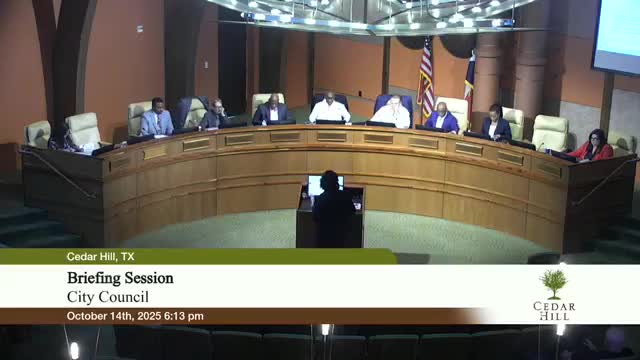Linebarger reports $751,379 collected for 2024 as council hears delinquent-tax update
Get AI-powered insights, summaries, and transcripts
Subscribe
Summary
Linebarger Attorneys at Law updated the Cedar Hill City Council on the city—s delinquent-tax collection program Oct. 14, reporting $751,379 collected for the July 2024—June 2025 cycle and outlining account status, payment options and enforcement steps.
On Oct. 14, 2025, at a Cedar Hill City Council briefing session, Pamela Popoli of Linebarger Attorneys at Law and client liaison Karen Bishop gave the council an update on the city—s delinquent-tax collection program, reporting $751,379 collected for the July 2024—June 2025 period.
The report matters because those collections recover revenue used for city services without additional direct cost to the city; Linebarger said the collection fees are charged to delinquent taxpayers and not billed to Cedar Hill. City staff earlier noted the city—s total delinquent roll exceeds $2 million and includes 1,107 delinquent accounts across tax years.
Pamela Popoli, the assigned partner representing Cedar Hill, outlined the collection process: the county certifies the tax roll in July, bills are mailed in October, taxes are due Jan. 31 and become delinquent Feb. 1. Linebarger receives business personal property accounts earlier in the year (April turnover) and the remainder of the roll on or about July 1. "We take a look at your roll, we stratify, we identify accounts that should not be in the collection program," Popoli said, explaining the firm—s outreach includes letters, phone calls, skip tracing, payment arrangements and, where necessary, lawsuits and sheriff sales.
Karen Bishop, Linebarger—s client liaison for Cedar Hill and Cedar Hill ISD, presented specific figures for tax year 2024: a base turnover of $730,253 from 669 accounts; a total delinquent roll of just over $2 million across 1,107 accounts; and $751,379 collected for the city and school during the July 2024—June 2025 period. Bishop said about 55% of delinquent accounts are considered collectible, roughly 18% are on hold (including exemptions and deferrals), and about 26.5% are classified as uncollectible (for example, accounts past statutory periods or under thresholds).
Bishop described enforcement activity during the July 2024—June 2025 year: 23 new lawsuits filed, 33 accounts disposed (by judgment, payment or dismissal), 11 bankruptcy filings handled by the firm—s bankruptcy practice, three sheriff sales posted and more than 1,700 letters mailed. She said she conducted 108 site visits during the period. Popoli noted the Dallas County tax office typically collects more than 90% before accounts are turned over to the firm.
On payment options and exemptions, Popoli said Linebarger offers payment arrangements—generally up to 12 months and up to 36 months for homestead accounts—and advises taxpayers about exemptions (over-65, disability, veterans) and deferrals. Bishop said if a taxpayer obtains an exemption after a lawsuit is filed, the firm will abate the lawsuit or place the account on hold rather than foreclose while the exemption is in force.
Council members asked clarifying questions about timing and accounting. Councilmember Sims asked why real-property accounts are only turned over in July; Popoli replied that the July turnover is a statutory schedule and that the county continues collection attempts before turnover. Councilmember Hayden asked whether the $751,379 figure was final for 2024; the presenters said collection efforts continue on outstanding accounts and that some accounts remain on hold or in bankruptcy.
No formal council action was taken on the Linebarger presentation; council members thanked the firm for its community outreach and flexible approach to working with taxpayers.
The presentation closed with staff and Linebarger offering to continue regular updates to the council.
